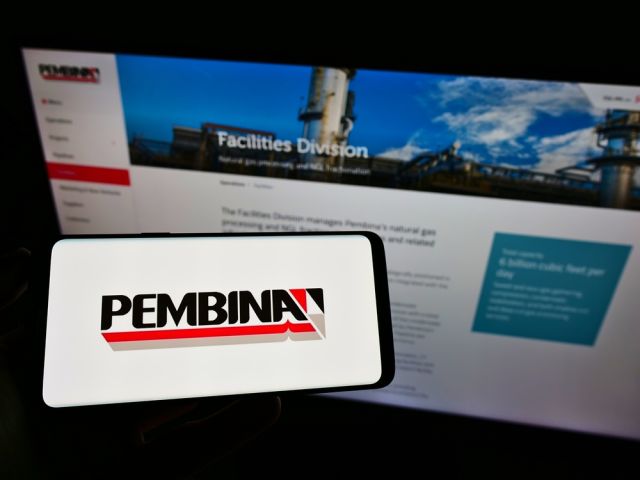
Pembina has a large condensate business in Edmonton, Sprott said, which should see a significant benefit from more oil production to fill TMX. (Source: Shutterstock)
In 2021, Pembina Pipeline Corp. executives formed a partnership with an indigenous group to explore buying a stake or even owning the Trans Mountain Pipeline (TMX).
After years of delays and cost overruns, TMX went into service on May 1, but Canada-based Pembina is no longer as interested, executives said during its first-quarter earnings call on May 10.
“We've been pretty consistent for some time—there exists a great deal of uncertainty still on TMX,” said Cameron Goldade, Pembina senior vice president and CFO. “Obviously, one very important milestone has passed with the pipeline coming into service.”
The company has concerns about the future toll structure for the pipeline, currently owned by the Canadian government, which has promised to sell it.
At the end of last year, the Canadian government approved interim tolls for the system so the pipeline managers could start charging for shipping as soon as the line started up. The interim benchmark toll was set at $11.46/bbl, applied to shippers with a 15-year contract, Reuters reported.
The next toll schedule is still under negotiations.
TMX will triple the flow of Canadian crude to the Pacific coast, adding 590,000 bbl/d in capacity. The cost of the project has been estimated at CA$30.9 billion (US$22.79 billion), more than four times its original budget. Most analysts doubt the pipeline will be able to pay for itself.
RELATED
For Sale? Trans Mountain Pipeline Tentatively on the Market
“I understand that the toll resolution process is ongoing and is likely to take some time to see resolution,” Goldade said. “And from our perspective, there still exists a tremendous amount of uncertainty around that asset.”
Pembina executives said they did see some positives to TMX’s completion. The boost in oil production in Alberta, where the pipeline begins, will help Pembina’s NGL operations, said Jaret Sprott, senior vice president and COO.
“The number one significant impact to Pembina long-term … is increased egress. It will raise the price of the heavier oils here in Western Canada,” Sprott said. “That should spur on incremental supply that will require condensate.”
RELATED
Imperial Expects TMX to Tighten Differentials, Raise Heavy Crude Prices
Pembina has a large condensate business in Edmonton, Sprott said, which should see a significant benefit from more oil production to fill TMX.
The midstream executives also discussed another major project, the Cedar LNG export terminal. The proposed terminal is to be located on the West Canadian Coast, far north of the TMX terminus point near Vancouver.
Pembina announced that it secured long-term commercial agreements for the project, crucial for the development of an LNG plant.
Thanks to the agreements, executives expect to make a final investment decision on the project in June.
Recommended Reading
Exxon Slips After Flagging Weak 4Q Earnings on Refining Squeeze
2025-01-08 - Exxon Mobil shares fell nearly 2% in early trading on Jan. 8 after the top U.S. oil producer warned of a decline in refining profits in the fourth quarter and weak returns across its operations.
Phillips 66’s NGL Focus, Midstream Acquisitions Pay Off in 2024
2025-02-04 - Phillips 66 reported record volumes for 2024 as it advances a wellhead-to-market strategy within its midstream business.
Equinor Commences First Tranche of $5B Share Buyback
2025-02-07 - Equinor began the first tranche of a share repurchase of up to $5 billion.
Q&A: Petrie Partners Co-Founder Offers the Private Equity Perspective
2025-02-19 - Applying veteran wisdom to the oil and gas finance landscape, trends for 2025 begin to emerge.
Rising Phoenix Capital Launches $20MM Mineral Fund
2025-02-05 - Rising Phoenix Capital said the La Plata Peak Income Fund focuses on acquiring producing royalty interests that provide consistent cash flow without drilling risk.
Comments
Add new comment
This conversation is moderated according to Hart Energy community rules. Please read the rules before joining the discussion. If you’re experiencing any technical problems, please contact our customer care team.





